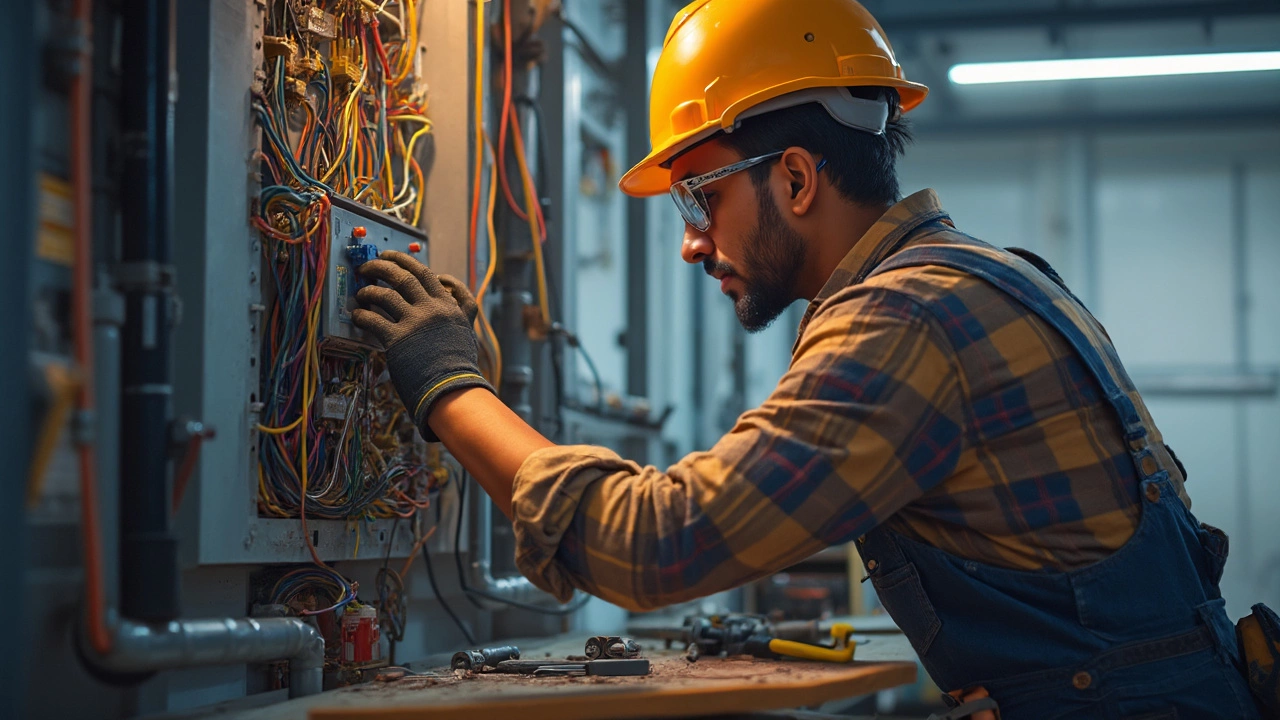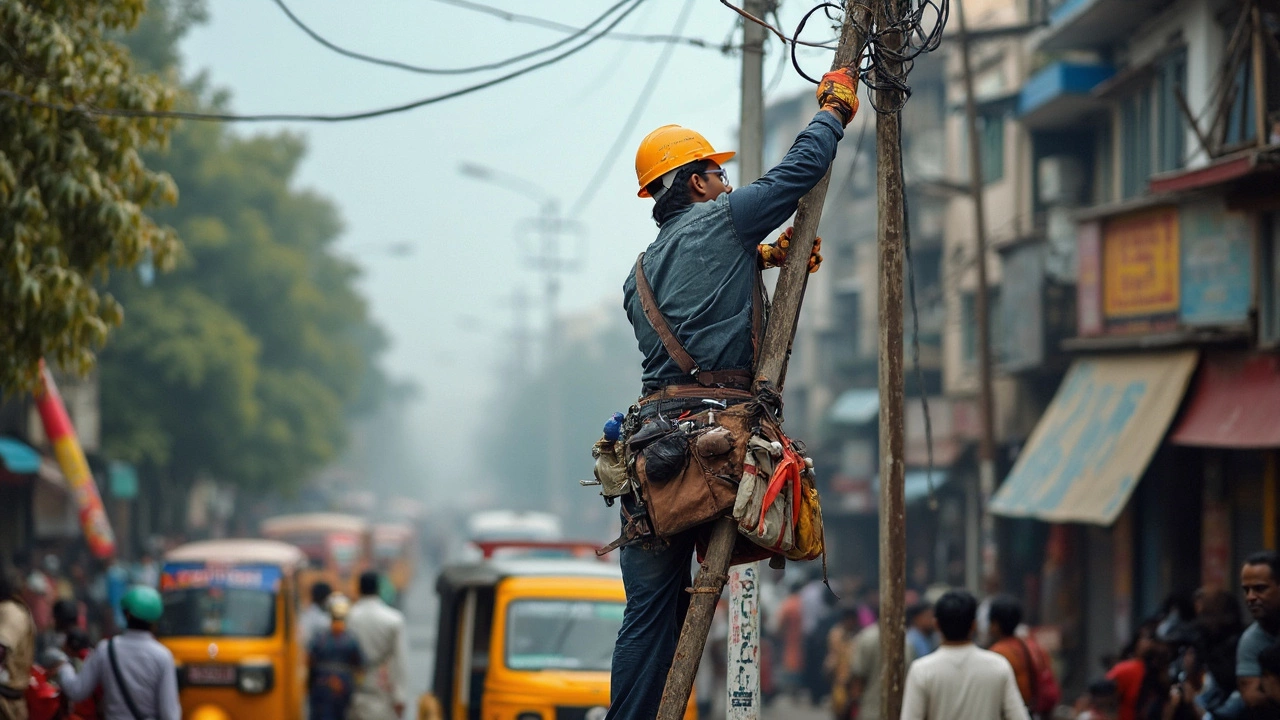
So, you've got a flickering light or a switch that's on the fritz, and you call up an electrician. Then, boom—it feels like you've just handed over your wallet. Ever wonder why electricians are so pricey? There’s a whole lot of behind-the-scenes action that justifies these costs.
First off, let's chat about training. Becoming an electrician isn't just about knowing which wire goes where. It's a blend of classroom study, supervised hands-on experience, and acing tricky exams. In many places, it can take years to become fully licensed. They’ve got to know their stuff inside and out—it’s a safety thing. Electric shocks, fire hazards—none of us want to mess around with that, right?
- Training and Certification
- Safety and Specialized Skills
- Tools and Equipment Costs
- Demand and Supply in the Market
Training and Certification
Alright, let’s get into why becoming an electrician isn’t as simple as fixing a loose socket. It kicks off with a serious education pathway. Most folks start with a high school diploma and then dive into technical school or an apprenticeship program. Did you know aspiring electricians typically spend about four to five years as apprentices learning the ropes?
This hands-on training isn't just about shadowing someone else. It covers the whole nine yards from wiring systems to safety regulations. And trust me, these safety lessons aren’t optional. You don’t want someone messing with electricity who doesn’t know how to avoid hazards.
After all that training, there's more. Electricians often need to pass state or national exams to prove they’ve got both the knowledge and the °know-how. It’s not just a one-and-done deal either. Many places require continuous education courses to ensure electricians stay on top of new tech and tools.
Interested in numbers? Here's something for the data enthusiasts:
| Country | Average Training Duration (Years) |
|---|---|
| USA | 4-5 |
| UK | 3-4 |
| Australia | 4 |
So yeah, it’s a big investment just to get started. By the time they’re working independently, electricians have poured a lot of time and effort into getting there. It’s like they’ve earned a mini-degree in keeping things running and safe!
Safety and Specialized Skills
When we think of electricians, safety is probably the first thing that comes to mind. These guys are dealing with potentially dangerous situations daily—ensuring that everything is wired up just right to keep everyone safe. Their specialized skills make sure that your home doesn't turn into a surprise light show when you least expect it.
Electricians have to have a deep understanding of electrical systems, which isn't something you can just wing. They're trained to adhere to strict safety codes and standards. Here in Dublin, like many other places, electricians must pass rigorous exams that test their knowledge on everything from electrical theory to the latest safety regulations. And guess what? These codes and regulations can change, so ongoing education is a must.
When they’re in the field, they aren't just guessing. Using special tools like voltage testers, circuit analyzers, and multimeters, they assess and fix electrical problems with precision. Being equipped with the right tools is crucial because it speeds up the job and keeps the environment safe for everyone involved.
Plus, electricians often have to work in challenging environments—think crawl spaces or unfinished buildings where one false move can be hazardous. Their specialized skills help them navigate these uncomfortable spaces safely. Having the right gear and protective equipment is part of why the costs can pile up, but it ensures the job’s done right without any hitches.
Here's the kicker: these safety measures don't just protect the electrician; they safeguard your home or business too. Investing in a professional electrician isn't just for temporary fixes— it's for long-term peace of mind.

Tools and Equipment Costs
Ever checked out the tool aisle and thought some of those gadgets look like they belong more in sci-fi movies than your toolbox? Well, that’s partly why hiring electricians isn’t cheap. They need an arsenal of specialized tools and equipment to tackle any job that comes their way.
Basic tools like wire strippers, pliers, and screwdrivers are just the beginning. Advanced gadgets such as circuit testers, voltage meters, and thermal imaging cameras are essential for thorough inspections and detailed work. A top-notch digital multimeter, for example, can set an electrician back hundreds of euros, but it’s crucial for accurately testing electrical circuits. This accuracy ensures safety and durability for any electrical setup.
Then there are the safety tools. Electricians need gear like insulated gloves, protective helmets, and goggles. These aren't your typical DIY accessories; they're specially designed to protect from electric shocks and ensure safe working conditions.
Talking about bigger projects, electricians sometimes need to break out the heavy-duty stuff like conduit benders, cable pullers, and hydraulic crimping tools. A hydraulic crimper, a vital tool for many installations, can easily cost several thousand euros. These are investments that effective electricians must make, so when we call them for a job, we’re also tapping into their well-equipped toolbox.
Moreover, let's not forget the cost of maintaining and replacing tools, as they do wear out. This ongoing expense is another hidden reason why the fees can seem steep, but when you factor in the necessity and care involved, it makes sense. The right tool at the right time can mean the difference between a quick fix and a day spent troubleshooting—nobody wants to be stuck in the latter!
Demand and Supply in the Market
Alright, here's the deal with the market for electricians: it's all about demand and supply. Simple economics, really. Right now, there’s a serious demand for skilled electricians, especially with all the tech stuff we cram into our homes and businesses. Smart home devices, complex electrical systems, and green energy solutions need pros who know their circuits from their circuit breakers.
But the supply side's another story. There aren't enough young folks jumping into the trade. Most kids these days aren’t considering trades like they used to, thinking more about tech or finance jobs, you know? That's where the electrician costs go up. Fewer pros mean higher fees because their time is super valuable.
Check this out: in 2024, it was reported that there was a 10% shortage of qualified electricians in Ireland. That’s a big gap, folks! When there’s a high demand and not enough supply, the ones out there can set their rates a bit higher.
Another kicker is geographic location. Urban areas typically see higher rates because the cost of living is higher, and travel costs for electricians can add to their expenses. In rural areas, though, it might be a bit cheaper—if you can find an electrician willing to travel out there, that is!
So, next time an electrician hands you a bill, now you'll know partly why: high demand, short supply. It’s not just about fixing a wire; it’s about delivering expertise in a field that’s swiftly growing and endlessly necessary.